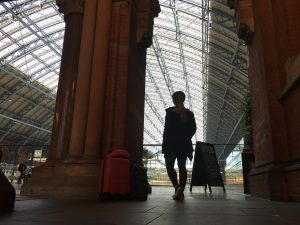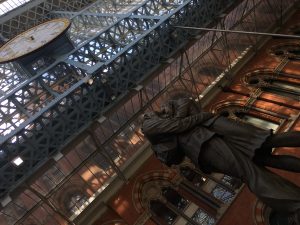In my final year of high school, I took Literature 12 with Mr. Cook, who was a firm believer of a Shakespeare conspiracy. When I say “firm believer,” I mean firm believer: he introduced the idea simply as though it was fact, as if it were common knowledge that “Shakespeare” was actually Edward de Vere, 17th Earl of Oxford. One of Mr. Cook’s biggest qualms with the idea of William Shakespeare having penned “Shakespeare’s” plays and poems was the (alleged) unlikelihood that some small town boy from Stratford-upon-Avon could dream up the politics of the aristocracy or royalty, of foreign countries, far-off places.
Today, I visited Stratford-upon-Avon, supposedly the most convincing piece of evidence that William Shakespeare couldn’t be the father of  British English literature, the literary genius that the discipline holds him up to be. You understand how the idea dismantles a great bulk of my academic field: though I am not the most familiar with Shakespeare’s works as far as an English major goes, and I am skeptical of the British white male canon in general, I was eager to make a pilgrimage to Shakespeare’s home.
British English literature, the literary genius that the discipline holds him up to be. You understand how the idea dismantles a great bulk of my academic field: though I am not the most familiar with Shakespeare’s works as far as an English major goes, and I am skeptical of the British white male canon in general, I was eager to make a pilgrimage to Shakespeare’s home.
Although it is quite a bustling tourist destination now, with shops and cafes and big tour buses rolling through it, the market town’s medieval grid pattern of streets is still preserved, for the most part, meaning that Shakespeare would have little trouble navigating the town if he were to walk through it today.
Far from high street and the Shakespeare Centre, however, it is different. “I like it here… it’s quiet,” my incredibly hospitable host, Tita Ma’an, commented as we walked to Holy Trinity Church and the site of Shakespeare’s grave.

Its oozing Englishness and quiet streets hardly suggest to me an inability to write about royalty or Verona. As we walked back to the Shakespeare Centre, I looked about me at Stratford-upon-Avon and thought: If I grew up in this town, I would enjoy nothing more than imagining thrilling worlds.
This is not to say that I feel like Shakespeare felt stifled in Stratford-on-Avon. When we visited Sherwood Forest later in the day, there was no signal, and all I wanted to do was write; I imagine Shakespeare felt far freer to focus on his writing in his small town than he did in London. More to that point, the houses of the Shakespeare Birthplace Trust (Shakespeare’s birthplace, the garden now planted where his last house once stood, and the home of his eldest daughter) impressed upon me the value of family to William Shakespeare. The immense love, care, and heartbreak of Shakespeare’s family life show themselves in his work. From passionate sonnets to despairing parents who have lost their children, it is clear that life at home inspired Shakespeare as much as imagining Venice and Rome did.
Sitting in a cold Coquitlam classroom, the idea of alternative Shakespeares seemed almost possible. But walking through the streets and homes of Shakespeare’s life, you realize that the man did not need to live his plays to write them, and that beauty does not discriminate. Beauty—even of the simple kind—can beget wondrous beauty.

 I relish in the thrill and accomplishment of getting around a new city successfully and with relative ease. So far, despite its bustling metropolitan-ness, London has been simple enough to navigate.
I relish in the thrill and accomplishment of getting around a new city successfully and with relative ease. So far, despite its bustling metropolitan-ness, London has been simple enough to navigate.